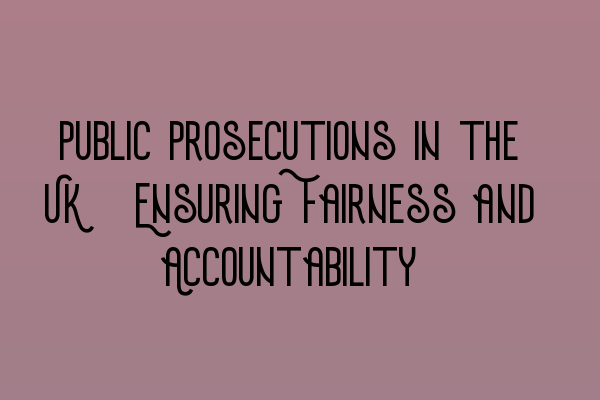Public Prosecutions in the UK: Ensuring Fairness and Accountability
In the UK, the criminal justice system plays a crucial role in maintaining law and order. One of the key elements of this system is the prosecution of criminal cases by the Crown Prosecution Service (CPS). The CPS is responsible for bringing charges against individuals accused of committing criminal offenses, and its main focus is on ensuring fairness, impartiality, and accountability throughout the legal process.
The Role of the CPS
The CPS acts as the public prosecutor in England and Wales, working closely with the police and other investigative agencies to build cases against suspects. Its primary duty is to determine whether there is sufficient evidence to charge an individual and, if so, to present that evidence in court. The CPS must adhere to a code of conduct that emphasizes the need for fair and objective decision-making.
To ensure fairness, the CPS considers both the strength of the evidence and the public interest in a case. It aims to pursue cases where there is a realistic prospect of conviction and where prosecution is in the best interests of the public. This approach helps to balance the need for justice with the efficient use of resources.
Transparency and Accountability
Accountability is a fundamental aspect of the criminal justice system, and the CPS is committed to maintaining high standards of transparency. It regularly publishes information about its decisions and outcomes, allowing the public to assess its performance. This transparency helps to build trust in the justice system and ensures that the CPS is held accountable for its actions.
In recent years, the digital revolution has had a significant impact on how information is shared and accessed. This has presented new opportunities for the CPS to enhance transparency and engage with the public. The CPS website, for example, provides valuable resources such as frequently asked questions, guidelines on specific offenses, and information on court proceedings. These online resources contribute to a better understanding of the criminal justice system and its processes.
To further increase transparency, the CPS has also embraced social media platforms. It actively communicates with the public through channels such as Twitter and Facebook, providing updates on important cases and initiatives. This direct engagement helps to bridge the gap between the CPS and the wider community, fostering a sense of shared responsibility for the administration of justice.
Continuous Improvement
The CPS recognizes the importance of continuous improvement in its quest for fairness and accountability. It regularly reviews its processes, policies, and practices to identify areas for enhancement. Feedback from stakeholders, including victims, witnesses, and legal professionals, is a vital source of information for these reviews.
By analyzing feedback and learning from past cases, the CPS can refine its approach and ensure that justice is delivered effectively. This commitment to continuous improvement reflects the CPS’s dedication to upholding the highest standards of fairness and accountability.
In conclusion, public prosecutions in the UK are underpinned by a commitment to fairness and accountability. Through the work of the CPS, the criminal justice system strives to ensure that all individuals are treated justly and that the public interest is upheld. Transparency, active engagement with the public, and a dedication to continuous improvement are the driving forces behind the prosecution process.
If you are interested in learning more about criminal law and practice, preparing for the SQE exams, or finding relevant exam dates, please check out our related articles:
- SQE 1 Practice Exam Questions
- SQE 1 Practice Mocks FLK1 FLK2
- SQE 2 Preparation Courses
- SQE 1 Preparation Courses
- SRA SQE Exam Dates
